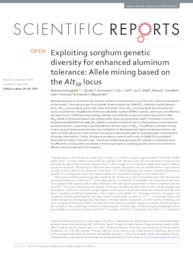Exploiting sorghum genetic diversity for enhanced aluminum tolerance: allele mining based on the AltSB locus.
Exploiting sorghum genetic diversity for enhanced aluminum tolerance: allele mining based on the AltSB locus.
Author(s): HUFNAGEL, B.; GUIMARÃES, C. T.; CRAFT, E. J.; SHAFF, J. E.; SCHAFFERT, R. E.; KOCHIAN, L. V.; MAGALHAES, J. V.
Summary: Root damage due to aluminum (Al) toxicity restricts crop production on acidic soils, which are extensive in the tropics. The sorghum root Al-activated citrate transporter, SbMATE, underlies the Al tolerance locus, AltSB, and increases grain yield under Al toxicity. Here, AltSB loci associated with Al tolerance were converted into Amplification Refractory Mutation System (ARMS) markers, which are cost effective and easy to use. A DNA pooling strategy allowed us to identify accessions harboring rare favorable AltSB alleles in three germplasm sets while greatly reducing genotyping needs. Population structure analysis revealed that favorable AltSB alleles are predominantly found in subpopulations enriched with guinea sorghums, supporting a possible Western African origin of AltSB. The efficiency of allele mining in recovering Al tolerance accessions was the highest in the largest and highly diverse germplasm set, with a 10-fold reduction in the number of accessions that would need to be phenotyped in the absence of marker information. Finally, Al tolerant accessions were found to rely on SbMATE to exclude Al3+ from sensitive sites in the root apex. This study emphasizes gene-specific markers as important tools for efficiently mining useful rare alleles in diverse germplasm, bridging genetic resource conservation efforts and pre-breeding for Al tolerance.
Publication year: 2018
Types of publication: Journal article
Unit: Embrapa Maize & Sorghum
Keywords: Alumínio, Germoplasma, Marcador Genético, Sorgo, Tolerância, Toxicidade
Observation
Some of Embrapa's publications are published as ePub files. To read them, use or download one of the following free software options to your computer or mobile device. Android: Google Play Books; IOS: iBooks; Windows and Linux: Calibre.
Access other publications
Access the Agricultural Research Database (BDPA) to consult Embrapa's full library collection and records.
Visit Embrapa Bookstore to purchase books and other publications sold by Embrapa.

